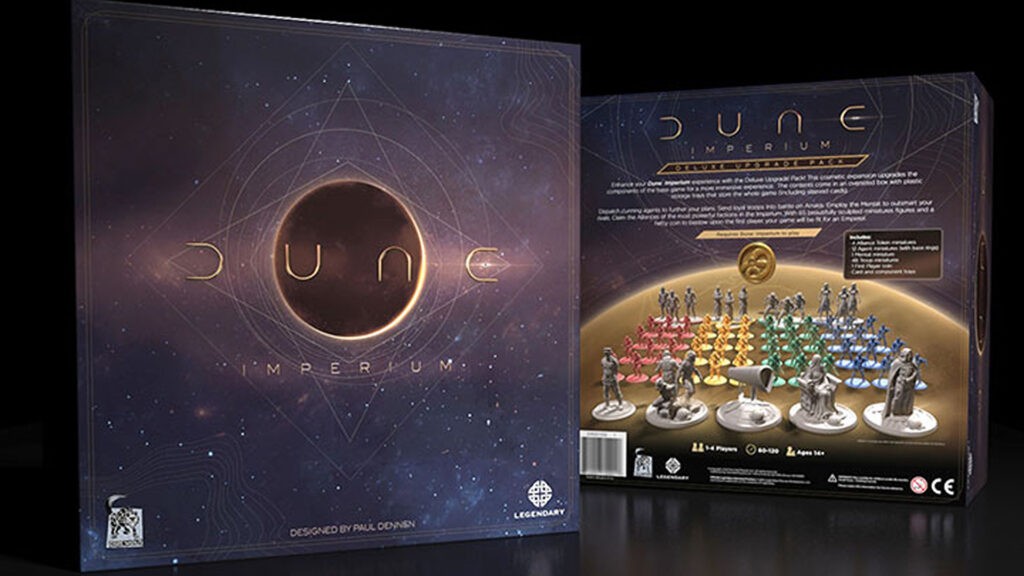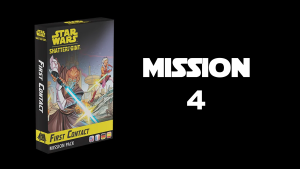Welcome to Why You Should Play, a series about board games and what makes them entertain, stimulate, and inspire us.
This series is not focused on reviewing or teaching games. Rather, it attempts to explore what aspects of the game might make it appeal to the reader.
On to the game!
Dune: Imperium is a deckbuilding and worker placement game for 1 to 4 players. Based on the upcoming Dune adaptation, each player takes on the role of a leader of the great houses. Players first customize their deck and use unique character powers to expand their worker placement options and optimize control over the games resources. Then, you’ll send troops into a battlefield that not just won with strength, but also with intrigue and deception.
So, why should you play Dune: Imperium?
The Theme
There has been a lot of talk about how interesting the combination of deck-building and worker placement is, but what really stands out to me is the tension that the game provides throughout. The progression through the game is a slow burn, played out over 10 rounds of posturing, bluffing, and influencing the political and military battlefields . For that reason, despite the mechanisms themselves not being thematic, the game really does make you feel like you are playing in the Dune universe, and that is a great accomplishment for a eurogame. If you like the political intrigue of the Dune universe, you don’t need to hear any more, this game is probably for you.
Aside from gameplay, the art also does a great job of bringing you into the Dune Universe. I really like the watercolor style of the card art. Most of the character art appears to be based on the Dennis Villeneuve film where possible, but there is plenty of other original card art that convey the ideas of Dune really well. I’ve heard a lot of complaints about the board, the cubes and even the card art. Honestly, I actually quite like the design and layout of the board. For them to put so many symbols on such a reasonably sized board and be able to keep it so clean is a great accomplishment, and i’m really surprised how much criticism this board has gotten. I think it’s great.
Workers spaces and cards both generally do thematic things. First let’s talk about the worker spaces on the board. The Spacing Guild allows players to trade Spice for a substantial influx of troops.The Bene Gesserit spaces provide the only way on the board to trash cards from your deck. The Freman spaces are the only place to get water and also allow you to exchange water for additional troops. Probably my favorite space on the board, and one that newer players might underestimate at first, is the Mentat space, which allows players to draw a card and grants access to a special worker for the current round. At first glance, this doesn’t seem very good. For the cost of two Solari, you are paying a card and a worker to get a card and a worker, essentially skipping a turn. But far from being a negative, this allows players to change the turn order. Because each player reveals the cards in their hand after they have played all their workers to the board, it allows players to react and alter their decisions later in the turn. Thematically, it’s spot on for what I would want a Mentat to do in a Dune game.
Card wise, Military characters add troops, political operatives provide intrigue cards, the Fremen give you water, and the Bene Gesserit allow deck manipulation. Cards based on foundational characters and events feel like the game changers they should. Worm Riders allows you to add troops based on your Freman influence. The Sardaukar Legion lets you rush into the battlefield at any point during the turn. And the Emperor specific card allows you to straight up buy a victory point. In a game that ends at 10 victory points, that’s incredible. All in all, Dune: Imperium is about as thematic as you can expect a game like this to be, so I think the designer deverses a lot of credit here.
Lastly, I want to give a shout out here to Dire Wolf productions for producing a really high quality game for the very reasonable price of $50 USD. I think that’s being lost among some of the criticism here. On top of that they made the deluxe upgrade pack, which includes mostly plastic minutes, an optional purchase. As someone who prefers the substance of a game over the style that many of today’s overproduced kickstarters deliver, this is welcome. Players who want to bling out their game can do so without me needing to shell out $100 for a game.
Deck Building with Multi Use Cards
I’m a sucker for multi use cards. And in Dune each card in your starting deck, and every card you acquire throughout the game, has two uses, and multiple abilities when. The first use will be to place an agent onto the board. Each card lists both the places that the card allows you to go to and any special abilities associated with playing the card. Then, after all your agents have been placed on the board, you’ll use the cards remaining in your hand for their reveal effects.
For each card brought you must consider in which situations it would be beneficial – are you going to be using it primarily to place workers on the board – or do you need it for the reveal ability. Forming alliances with the different factions is vital to obtaining victory points needed to win, and cards that provide access to multiple factions are rare. Buying multiple cards of one faction will shoot you up their allegiance track quickly, but will also cut you from consistent access to the other factions, potentially leaving you in a tricky situation.
The reveal effects of cards primarily allow you to buy additional cards using persuasion and add to your power in battle, and is another important aspect to consider when buying cards.
Purchasing the most powerful cards generally requires between 5 and 9 persuasion. Most cards only provide one or two persuasion, so in order to buy these powerful cards. you’ll need to acquire a critical mass of cards in your hand. Thankfully there are spots on the board that provide both card draw and persuasion, both of which will be vital to this strategy.
Reveal effects on cards tend to add between one and three swords to the current battle, although a few of them go as high as five or six with the right alliances. Oftentimes this will be the crucial difference between first and second place in a battle. Player order matters a lot here, as players reveal once they are finished with their worker actions. Players will often indicate how far they intend to push for victory with their worker actions, and players later in the turn order will have more opportunity to react.
All this adds depth and complexity to card purchases. Dune is not the type of deck building game in which you can buy just any card and be successful. Every decision must be carefully considered.
The Battlefield
The conflict step is where a lot of games will be won or lost. Aside from faction alliances, winning battles is one of the best ways to score victory points, with many conflict reward cards offering one or two points to the winner.
What really makes this aspect to the game click is the epp and flow of player order. Being the first player means you have more open spaces on the board for your workers. It also means providing your opponent with important information in regards to your intentions. You’ll often be telegraphing how highly you prioritize combat each round.
The importance of turn order is present throughout the entire game. It determines who gets to place workers first, who has to reveal their hand first, and who can play intrigue cards first. Sometimes you’ll want to go first, perhaps to have first choice on where to place your workers and what cards to buy. Other times you’ll want to go last, carefully trying to outwit your opponent on the battlefield.
I expected conflict would be one of my least favorite parts to the game, but because of the way it’s integrated into every aspect of the round, it doesn’t feel tacked on at all. In fact, sitting on the sidelines while two of your opponents overcommit to the battle feels immensely satisfying.
It might not be for you if…
Despite how much I’ve enjoyed the game, there are definitely reasons to temper expectations here. This game is by no means perfect.
Let’s start with the Intrigue cards. There are three cards (out of fourty) in the deck that provide endgame victory points or a tiebreaker. Because intrigue cards are drawn at random, and because it’s an easy source of victory points for the lucky player, I don’t feel they belong in the Intrigue deck at all. The Plans Within Plans card seems especially egregious because it’s not difficult to get to 2 additional victory points at the end of the game with this card. Instead, I’d love to see intrigue cards that can withdraw troops from the battlefield. This would add so much more bluffing and Intrigue (pun very much intended) to the conflict and fits perfectly with the Dune theme.
I think that cards that add endgame victory points could stay in the game, but I’d love to see them put on the cards you add into your deck. In fact, I mentioned that alliances and conflict are two major ways to win victory points, but I wish you were able to use cards in your deck to generate endgame victory points. It would add another layer of depth to the game, another battlefield to compete for.
Next, I’ll mention the deckbuilding. Dune won’t make you feel like you are building an engine or a victory condition within your deck itself. I mentioned above that adding cards with endgame scoring conditions would be a great way to put more emphasis on the deckbuilding, and would allow players to compete for victory without a major focus on conflict. It’s also surprisingly hard to build combos via deckbuilding. There are some faction cards that allow you to activate a special ability if you’ve already played another card of that faction, but this rarely happened, and had little impact when it did. I wish they had tied more card abilities to your faction influence. That would have felt more thematic, and it would have been easier to trigger. As it stands right now, you have to draw two faction cards in the same hand of five, and then also play them in a specific order to trigger the ability. It’s not great.
Another issue with the deckbuilding is the card row, which can get clogged with unappealing cards. Because there is no way to cycle cards, and cards don’t naturally drop off, it’s easy to look at the card row and not be particularly happy with your choices. This is especially true mid to late game when you might only see a card you buy once or twice. Not having a card that feels impactful can be deflating. It would have been great if you were able to cycle cards, perhaps by paying resources. Solari would have been a good choice, since it feels less useful late game once you’ve visited some of the council spots.
All in all, my dissatisfaction with some aspects of the deck building stems from the fact that I like deckbuilding much more than worker placement. Dune definitely feels like a worker placement game first, and deckbuilder second, and it’s important you know to expect that going into the experience.
Lastly, I’ll mention the cut throat nature of the conflict. Each conflict you’ll lose any troops you send into the battle, even if you don’t win. That can absolutely lead to blowouts. Turns that you commit your workers, cards, and troops to battle and come away only with a consolation prize. You can go all in and lose, and when you do, it will hurt. It wasn’t an issue for me personally, and I never felt like I lost a game because of a specific conflict defeat, but if that’s the type of thing that puts you off a game, you might want to stay away from this one.
Bottom line
It might seem like I have a lot of issues with the game, but that’s only because the game is so enjoyable that the flaws feel like they stand out. Most of the issues can easily be fixed with an expansion and/or house rules, but if any of the issues are deal breakers for you, go ahead and stay away from this one.
Despite the issues, Dune: Imperium still feels like it comes together to produce a satisfying result, one that succeeds in blending multiple euro mechanisms into a tight, thematic experience. Bottom line, if you like the Dune universe, if you like games that play well at all player counts, if you like tense games where every decision is impactful, then you should absolutely own Dune: Imperium.
Patrick Murphy is an avid board gamer, book reader, tv watcher, and just generally an all around nerd. Aside from buying more board games than he has time to play, he also enjoys X-Wing, Magic: The Gathering (EDH), and explaining in great detail why you should absolutely read that thousand page fantasy novel. You can contact him at patmurphy1986@gmail.com.





